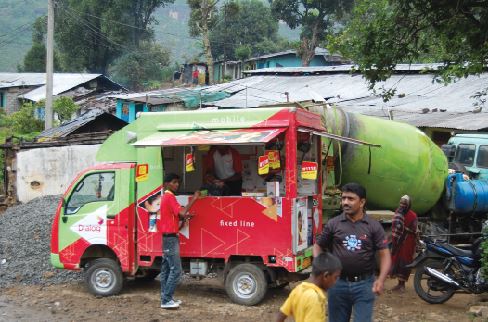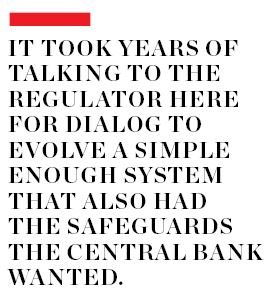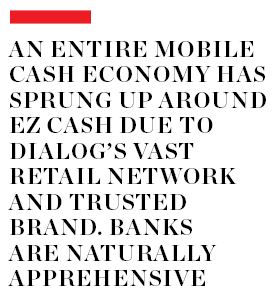

Banking on mobile money
Financial innovation got a bad rap during the global banking crisis. Even in Sri Lanka a number of financial firms run by incompetent and corrupt directors and management were teetering or had fallen off the edge of a cliff. The economic double whammy of a global financial sector shock and a mini crisis here had […]
Financial innovation got a bad rap during the global banking crisis.
Even in Sri Lanka a number of financial firms run by incompetent and corrupt directors and management were teetering or had fallen off the edge of a cliff. The economic double whammy of a global financial sector shock and a mini crisis here had put the regulator on guard against innovation that could potentially leave transactions unfulfilled and savers without recourse. While an apprehensive regulator was mulling risks, mobile commerce was sweeping across the developing world.
It’s difficult to ignore that mobile phones are no longer just yuppie play things. In the last decade they have empowered millions of rural poor people, compensating for poor public transport, difficulty in obtaining information about government services and making small businesses more efficient. In parts of Africa, where mobile phones are also ubiquitous, they are being successfully used for transferring money and making payments. In 2007, telco Dialog – a unit of Malaysian Axiata – approached the Central Bank to figure out how it could also launch a mobile payment and money transfer services here.
The global financial crisis and the confidence shaking collapse of some Ceylinco group-controlled firms here however had made regulators wary of financial sector innovation. “Each time something went wrong the screws were tightened and we were at the receiving end,” explains Fariq Cader, who heads mobile commerce at Dialog, explaining the challenge posed by the environment to the firm’s ambition to set up a USSD based (Unstructured Supplementary Service Data) money transfer and payments system that users can access through text messages.
Mobile money allows cash to travel as quickly as a text message. Broadly, two types of transactions are possible with Dialog’s mobile money service eZ Cash, finally launched in June 2012. The first; transactions a user can do by herself by topping up the account – also called a wallet – with electronic money like paying a utility bill, purchasing a product, donating money, paying for insurance, or purchases on the internet. The second type of transaction requires assistance from one of Dialog’s 13,000 eZ Cash merchants. A customer, by handing cash to a merchant – usually a shopkeeper – can have a utility bill paid, cash transferred to a friend or make an insurance premium payment.
Village corner stores – equipped with an eZ Cash networked mobile phone – are now rather like bank branches. Mobile money transactions are done through text messages. A customer can buy credits from eZ Cash registered corner stores or supermarkets island-wide. A Dialog text immediately confirms the credit. eZ Cash credits can be used to purchase pre-paid call credits or make post-paid bill payments, but not the other way around. On average there are Rs2 billion a month in Dialog call credit top-ups.
Nearly a million Dialog subscribers had registered for eZ Cash by May 2013 – by sending a simple text message. “We expected about 300,000 registrations by year-end (2012) but we ended up with about 750,000,” Cader notes, pointing to the enthusiastic take up.
Transferring money to other registered users is done the same way, by texting Dialog the amount and the recipient’s phone number. A mobile money receiver can pay for Dialog services, pay for goods, pay utility bills or withdraw it by visiting one of 13,000 eZ Cash linked corner stores. Although eZ Cash is acceptable currency to buy goods at corner stores the practice hasn’t picked up yet. Not all 40,000 Dialog ‘reload’ merchants are registered for eZ Cash; not yet anyway. Corner stores have a commission-based incentive for being part of the system. They receive a commission for utility bill payment but for facilitating withdrawals commissions vary. These commissions are charged to the customers.
Convenience seems to be the driving force behind eZ Cash. A second – more popular – way to transfer money is to hand cash to a corner store with the phone number of the receiver. The receiver has to be a registered user but the sender need not be. “We actually thought this would happen,” says Cader about the preference for using a corner store which reduces two steps out of the process compared to an account top-up and transfer. “It’s not the Rs5 cost but the convenience that’s driving people this way.”
eZ Cash isn’t Dialog’s first foray in to mobile money. An earlier iteration, eZ Pay launched in 2007, tanked because it required users to register and have an account with a particular bank – in this case NDB, Seylan or finance company LOLC. Despite failure the firm’s hunger for mobile money didn’t diminish, seeing how quickly such services caught on in places like the Philippines, as early as 2001. “We wanted to overcome the drawbacks in the first solution,” confides Cader. “Here those barriers were completely withdrawn.”
The financially excluded are intimidated by paperwork, something Dialog learned with the failed eZ Pay, its first mobile money product. Dialog’s challenge was to convince the regulator to remove the hassle for customers of having fill out ‘know your customer’ forms and providing other information required to pair bank accounts with mobile money. “If customer inconvenience comes into the picture the product gets killed,” says Cader about the harsh lessons Dialog had learned.
The Central Bank applied the principle of proportional risk, allowing low value transactions and depending on the customer information already available in the mobile phone contract. eZ Cash transactions are restricted to Rs10,000 a day and eZ Cash Power Users – who have to fill-out additional paperwork to upgrade the account – can transact up to Rs25,000 per day.
The convenience of mobile money has also freed people from restrictive alternatives of paying bills at banks which have limited business hours and are difficult to access in rural areas and post offices which close for business at 2 pm in the afternoon.
 It took years of talking to the regulator here for Dialog to evolve a simple enough system that also had the safeguards the Central Bank wanted. The solution was a custodian account where every rupee in the eZ Cash eco system is matched. So in the unlikely event that Dialog goes bankrupt, customer money won’t be sucked in to a liquidation pool to pay off creditors on a preferential basis. Regulator also worried mobile money will become the preferred currency of fraudsters and money launderers.
It took years of talking to the regulator here for Dialog to evolve a simple enough system that also had the safeguards the Central Bank wanted. The solution was a custodian account where every rupee in the eZ Cash eco system is matched. So in the unlikely event that Dialog goes bankrupt, customer money won’t be sucked in to a liquidation pool to pay off creditors on a preferential basis. Regulator also worried mobile money will become the preferred currency of fraudsters and money launderers.
Other safeguards have also been built in to the system despite Dialog’s not having a banking license or its eZ Cash registered corner stores not having the sophistication or controls available at bank branches. To pay for an internet purchase a customer submits the wallet number and enters a four digit pin. Dialog then texts a random four digit pin which also has to be submitted to complete a transaction. “It’s what we call a second factor authentication in the financial world or a security token,” Cader explains. “So it’s not good enough to have the wallet and pin number, you must also have the phone to complete a transaction.”
 Although slow, the approval proved the regulator was an enlightened one. Others in the region haven’t been so accommodative. Pakistan’s Telenor acquired a banking licence in 2008 to overcome regulatory apathy. Only Telenor’s mobile customers can open ‘Easypaisa’ accounts, at its bank, which are very similar to normal bank accounts. In other markets like Kenya regulators were forced to take a more enlightened approach because the product had taken off before they had got around to regulation. In the Philippines mobile cash operates unhindered, but allow the financial regulator unfretted access.
Although slow, the approval proved the regulator was an enlightened one. Others in the region haven’t been so accommodative. Pakistan’s Telenor acquired a banking licence in 2008 to overcome regulatory apathy. Only Telenor’s mobile customers can open ‘Easypaisa’ accounts, at its bank, which are very similar to normal bank accounts. In other markets like Kenya regulators were forced to take a more enlightened approach because the product had taken off before they had got around to regulation. In the Philippines mobile cash operates unhindered, but allow the financial regulator unfretted access.
Daily eZ Cash transactions by March 2013 (excluding money transfers and withdrawals), topped Rs8 million a day. The better than expected take-up has encouraged Dialog to raise expectations. “By year-end (2013) I would want to triple this,” points out Fariq Cader who is Senior General Manager, New Business Development and Mobile Commerce at Dialog Axiata, a position he took up in early 2010.
Around 85% of transactions are ones involving assistance of an eZ cash registered corner store – where users pay cash to settle a utility bill or a Dialog mobile bill, the two most popular things to do now. Dialog bill payments are free while paying a utility bill is charged Rs20 irrespective of the value. Money transfers between Dialog users and withdrawals, which also involve a corner shop, touch another Rs2 million daily.
An entire mobile cash economy has sprung up around eZ cash due to Dialog’s vast retail network and its trusted brand. Banks, because of their inability to offer 13,000 cash withdrawal points and applications allowing customers access to their money on a mobile, are naturally apprehensive. “We have built that trust and we have the merchant network to support it. But for a bank to do the same thing with their controls and other requirement, the cost will be enormous,” Cader points out.
 Mobile money, when successful in poor countries, offers a simple solution. A migrant worker in Colombo can pay his home electricity bill or transfer money to his family, which they can withdraw from the village corner store, instead of making a half-day, 20-kilometre trip to the nearest bank in town, an unproductive use of time. It’s also safer for a worker in the city to use mobile money, instead of carrying wads of cash around. Because mobile transactions are easy to trace it’s difficult to embezzle undetected.
Mobile money, when successful in poor countries, offers a simple solution. A migrant worker in Colombo can pay his home electricity bill or transfer money to his family, which they can withdraw from the village corner store, instead of making a half-day, 20-kilometre trip to the nearest bank in town, an unproductive use of time. It’s also safer for a worker in the city to use mobile money, instead of carrying wads of cash around. Because mobile transactions are easy to trace it’s difficult to embezzle undetected.
Cader says the opportunity in the villages was a low hanging fruit. “The urban sector is a major challenge because we have to change the behaviour of people.” Of the 150 or so mobile cash services worldwide only around 10 are resoundingly successful. Two characteristics common in markets where mobile money has traction are low bank penetration and wide geographic dispersion of the population. Dialog’s mobile money operation isn’t yet profitable and two market factors underlining its success elsewhere are only partially relevant here. In its next wave of tie-ups Dialog plans to tap hotels, restaurants and hospitals. Ceylinco, Janashakthi, Allianz, Amana Takaful and HNB Assurance life insurance premiums can now be paid through the eZ Cash network.
Providing services increases stickiness and makes customers more phone-reliant, a useful thing for any mobile operator. Secondly, in a growing market it’s able to facilitate a payment for anything that has a unique reference, from a utility bill to a school OGA membership.
Dialog is a champion of small but voluminous transactions. Its average mobile calling credit top up is Rs50 and thousands of such top-ups are done every day. “In a sense we complement each other because we take on smaller ticket items whereas banks are capable of taking care of the bigger ticket items,” argues Cader who is keen to get more banks to recognise eZ Cash, allowing their customers to pair bank accounts with the service. “Volume is more important to us,” he says, “we want people to get used to this and it’s more like a behaviour change we are out to achieve.”
Around Colombo and main cities ubiquitous bank cash machines and widespread credit card use make mobile cash less useful. But for dozens of small online businesses, some selling goods on social networks like Facebook, eZ Cash is an easy solution. Parents, working late, pay for meal deliveries to their kids at home through the service. It’s also found practical use in some households to transfer cash to a domestic aid to buy groceries during a busy workday.
To reach the financially excluded even governments are using mobile money. Afghanistan uses mobile money to pay wages of police officers and other officials. The Tanzanian tax authority accepts mobile money tax payments. In many countries it’s used to deliver welfare or aid payments to the poor.
Kenya’s Safaricom, the biggest mobile operator there, is mobile money’s greatest success story and the benchmark for aspirants worldwide. M-PESA, Safaricom’s mobile money service has signed up around 70% of the country’s adult population and 25% of national GDP flows through it every year. A number of factors have helped including a young population that quickly caught on to M-PESA’s convenience, a regulator that mostly stayed out of its way, creaky infrastructure that made everyday things like bill payments a nightmare and high crime rates that made carrying wads of cash around unwise.
Naturally, banks are worried that mobile phone companies can become serious players in financial intermediation, something that Dialog is quick to dispel. “There is plenty of opportunity for payments, we are not looking at credit, that’s not our space,” points out Cader. Because Dialog doesn’t have a banking license – and has no intent to get one – it needs partnerships with financial institutions. So far it has been challenging to convince banks, according to Cader.
Convincing a million Dialog customers to use eZ Cash, the telco is now tempting them in to savings and insurance. To save money eZ Cash users will need a paired bank account, a service that may be launched soon. Since Dialog isn’t a bank it cannot accept deposits or pay interest on outstanding customer balances. Its early days, but Dialog believes there could be billions of rupees stuffed under mattresses earning nothing, that can potentially be introduced to financial channels. Recently eZ Cash’s Kenyan equivalent launched M-Shwari crossing in to micro credit in partnership with a commercial bank there. Customers can access a small overdraft with a one-off, 7.5% set up fee. Loan approval isn’t automatic and no explanations are offered if credit is refused. The telco’s most potent guard against default is the withdrawal of the phone number, which is a minor calamity in a mobile mad market. However, eZ Cash customers here can’t access credit even if they have a paired bank account.
 With micro savings soon off the ground, micro loans would be the next big opportunity for Dialog’s partnership with banks. Dialog expects a profit on eZ Cash in another year (two years after launch). “It will be converted to a profit centre later this year,” says Cader of the project that’s widely supported by the Malaysian Axiata-controlled firm although in its home market, Malaysia, mobile money never took off.
With micro savings soon off the ground, micro loans would be the next big opportunity for Dialog’s partnership with banks. Dialog expects a profit on eZ Cash in another year (two years after launch). “It will be converted to a profit centre later this year,” says Cader of the project that’s widely supported by the Malaysian Axiata-controlled firm although in its home market, Malaysia, mobile money never took off.
Mobile companies do offer some customers credit; for instance to post-paid users who may not promptly settle their monthly mobile, internet and pay TV bills. However mobile money’s greater contribution can be to serve the financially excluded because they are poor and intimidated by the formalities of banks. To achieve that, an enlightened regulator must rule that some of the rigid strictures applying to formal banking not apply in the same intensity to mobile money micro credit. Only then can micro savings and micro credit start breaking the cycle of poverty in poor rural communities. The regulatory flexibility is needed to make sure any micro credit solution is a simple one or risk a still birth.
Banks also need to start seeing mobile money as a means to serve the unbanked and not as a threat to their business. Telco’s have retail networks that reach far wider than does any bank and their brands are recognized and widely trusted. While mobile money makes inroads as a payment solution, in poor communities it has a shining opportunity to chip away at poverty.

